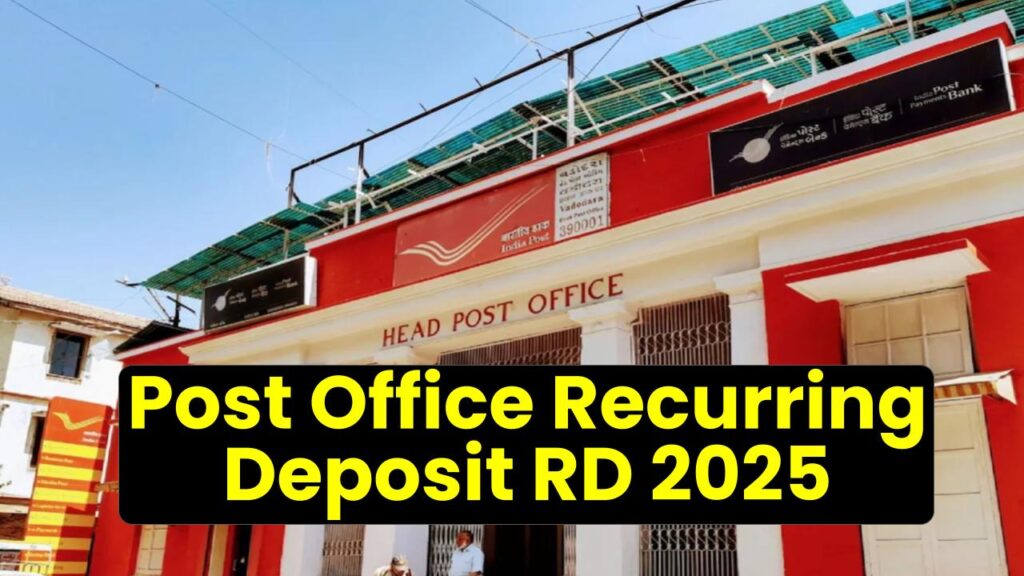Looking to grow your savings safely and steadily? A Post Office Recurring Deposit (RD) might just be the perfect choice for you. Whether you’re saving for a big purchase, planning for retirement, or simply want to stash away a safety net, the Post Office RD offers a reliable, risk-free way to grow your money. Let’s take a deep dive into how you can achieve a financial goal of Rs 12 lakh using this safe and easy-to-manage investment option in 2025.

Post Office Recurring Deposit 2025
| Feature | Details |
|---|---|
| Interest Rate | 6.7% per annum (subject to change quarterly) |
| Deposit Frequency | Monthly deposits |
| Minimum Deposit | ₹100 per month |
| Maximum Deposit | No upper limit (multiples of ₹10) |
| Tenure | 5 years (extendable in blocks of 5 years) |
| Tax Benefits | Eligible for tax deduction under Section 80C |
| Premature Withdrawal | Allowed after 1 year (penalty applies) |
| Government Backed | Yes, backed by the Government of India |
| Eligibility | Available to all Indian residents (individuals, minors) |
The Post Office Recurring Deposit is a simple, low-risk, and government-backed way to grow your savings over time. Whether you’re saving for a rainy day or for a larger financial goal like ₹12 lakh, this scheme offers a steady return with no surprises. Plus, the added bonus of tax benefits under Section 80C and compounded interest make it a smart choice for both beginners and seasoned investors.
What is a Post Office Recurring Deposit (RD)?
A Post Office Recurring Deposit is a government-backed savings scheme that allows individuals to deposit a fixed amount every month for a specified tenure and earn interest on that deposit. It’s a popular choice in India due to its low risk, high returns, and tax benefits under Section 80C of the Income Tax Act. The scheme is available in every post office across the country, making it easily accessible.
In 2025, the interest rates offered by Post Office RDs are 6.7% per annum (as of the latest update). While this rate may change quarterly, it is still a solid return compared to many other investment options. The best part? It’s government-backed, which means you’re not putting your hard-earned money at risk.
How Does Post Office RD Work?
Think of the Post Office RD as a way to force yourself to save consistently. Every month, you commit to saving a fixed amount—let’s say ₹1,000—for a 5-year period. That money earns interest, which compounds quarterly, meaning your earnings grow faster over time.
When the 5 years are up, you’ll get back all the money you deposited plus the interest earned on it. For instance, if you invested ₹1,000 a month for 5 years, you would have invested ₹60,000. The interest you earn would add up to a tidy sum—more than what you put in.

Example: Saving ₹12 Lakh with Post Office RD
Say you want to save ₹12 lakh over 5 years using the Post Office RD scheme. With an interest rate of 6.7%, your monthly contribution will need to be around ₹14,500. This would ensure that, at the end of the 5 years, you have accumulated your goal of ₹12 lakh, including both your initial investment and the interest. Here’s a simple calculation of how much you’d need to save each month to achieve your target:
| Monthly Contribution | Total Deposit | Maturity Amount (Approx) | Interest Earned (Approx) |
|---|---|---|---|
| ₹14,500 | ₹8,70,000 | ₹12,00,000 | ₹3,30,000 |
This example shows that saving a little less than ₹15,000 a month can get you to your goal of ₹12 lakh. Not too bad, right?
Why Choose Post Office RD?
If you’re wondering why the Post Office RD is a good choice for your savings, here are a few reasons:
1. Government Backed, Low Risk
The government of India guarantees the return on your deposit, so there’s no risk involved in your investment. Unlike stocks or mutual funds, you won’t lose your money in the market.
2. Compounded Interest
The interest on your RD is compounded quarterly, meaning you earn interest not just on your deposits but also on the interest you’ve already earned. This leads to faster growth of your money.
3. Flexible Deposit Amount
You can start with as little as ₹100 a month, which means even small savers can get started. The flexibility in deposit amounts makes it easy to adapt to your financial situation.
4. Tax Benefits
Under Section 80C of the Income Tax Act, you can claim a tax deduction for the amount you invest in the Post Office RD, up to ₹1.5 lakh annually. This can reduce your taxable income and lower your overall tax liability.
5. Premature Withdrawal Option
While the scheme is intended for long-term saving, you can withdraw prematurely after 1 year, though penalties apply. This gives you a bit of flexibility if you face unexpected expenses.
6. Easy to Manage
You don’t need to worry about complex investment strategies or market fluctuations. The Post Office RD is simple and reliable—just set it and forget it.
How to Start a Post Office RD
Getting started with a Post Office RD is pretty straightforward. Here’s a step-by-step guide:
Step 1: Visit Your Nearest Post Office
The first thing you’ll need to do is visit your local post office. You can check if there’s one near you using the official India Post Locator.
Step 2: Choose Your Deposit Amount and Tenure
Decide how much you want to save each month and for how long. If your goal is to accumulate ₹12 lakh, plan your deposit accordingly (like the example we discussed).
Step 3: Fill Out the Application Form
At the post office, you’ll be given a form to fill out with your details. Don’t forget to carry your Aadhaar card and address proof. The post office will help you with any questions during this process.
Step 4: Start Depositing Monthly
Once the account is opened, you’ll need to make your monthly deposits. You can do this via cash, cheque, or online transfer, depending on the facility provided by your local post office.
Step 5: Track Your Investment
You’ll receive a passbook that records your deposits and interest earned. You can track your investment easily.
FAQs
1. Can I increase my deposit amount during the tenure?
Unfortunately, once you’ve chosen your monthly deposit amount, it cannot be changed during the term. You would need to open a new RD account if you want to increase the amount.
2. Is there any penalty for missed payments?
Yes, there’s a penalty if you miss a monthly deposit. It’s typically ₹1 for every ₹100 you fail to deposit on time.
3. Can I withdraw my money early?
Yes, but there’s a penalty for premature withdrawal. If you withdraw before the maturity period (after 1 year), the interest rate will be reduced by 1%.
4. What happens if I don’t want to continue after 5 years?
After the initial 5-year term, you can either withdraw the full amount or extend the RD for another 5 years.









